January 6, 2021
2020-2021 Magnuson Scholars Winter Updates
Please join us in recognizing the 2020-2021 Magnuson Scholars’ exceptional achievements while also celebrating Warren G. Magnuson’s extraordinary public service career.
The 2020-2021 Magnuson Scholars are:
| Yan Ting (Blair) Zhao School of Dentistry |
Naomi Nkinsi School of Medicine |
Nathan Dreesman School of Nursing |
| Amy Li School of Pharmacy |
Haylea Hannah School of Public Health |
Asia Bishop School of Social Work |
Scholar Updates
Yan Ting (Blair) Zhao
School of D entistry
entistry
“Up to this date, I have submitted my manuscript to PNAS, and it is now under reviewer. I am now in the process of writing my general exam in form of an R01 grant. I will also do an oral presentation of my general exam to my committee member at the end of next spring quarter. My ultimate goal is to vascularize tooth organoids. I have clearly planned out my thesis aims. My first aim is to understand the regulation of angiogenesis by investigating the Tie2 pathway this is the work that was submitted to PNAS. I am now being to work towards my aim 2 and 3 to understand the specific genes controlling tooth endothelium and improve blood vessel formation and stability in general, respectively. I will work on these questions by (i) analyzing human tooth specific blood vessel development using single-cell sequencing data and (ii) utilizing computer-designed proteins to stabilize endothelial cell tight junctions. I am learning R-programming to dissect single-cell RNA sequencing data to understand tooth specific blood vessel development and to unveil the signaling pathways that govern the process. I am planning to utilize this new knowledge along with the Tie2 super agonists to promote endothelial cell differentiation for vascularize dentin/pulp organoids.”
Naomi Nkinsi
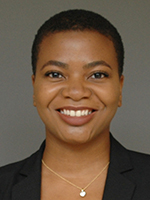
School of Medicine
“I am so grateful to have been selected as a Magnuson Scholar and would like to thank Senator Magnuson, his family, and the selection committee for this award. Since receiving this honor, I have continued with my studies in the MD/MPH program and have centered my work around health equity, particularly regarding racism in healthcare and medical education. In the last year I have published work in the journal Academic Medicine that investigates how race is discussed in medical education and how a lack of equity-centered curriculum perpetuates racial inequities in health outcomes. Additionally, I have been active in a movement to move our healthcare system away from using race-based clinical algorithms in clinical care. I’m continuing my research on the impact of food insecurity on HIV/AIDS health outcomes and am looking forward to being able to publish this work soon!”
Nathan Dreesmann
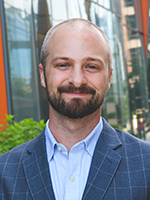 School of Nursing
School of Nursing
“The Magnuson award has been pivotal for my continued study and professional growth. Currently in my 4th and final year of my doctoral studies, it has been vital that I focus on my dissertation work. Over the last 6 months, support from the Magnuson award has allowed me take the time needed to revise my dissertation project (to be in alignment with COVID-19 protocols), proceed with recruitment and enrollment of participants, and complete the initial part of my dissertation study. A key element of this success has also been working with graduate and undergraduate students over the past two quarters. As Program Manager for the Soothe Workgroup, I have trained our interdisciplinary students in the use of virtual reality therapeutics, mixed methods analysis and how to present these analyses in a scholarly context. Additionally, I have had the opportunity to mentor two doctoral students in the School of Nursing on qualitative analysis techniques, and work with them on analyses for one of my dissertation papers. In summary, each of these opportunities have helped to spur my dissertation research, academic writing and personal growth, and all of this has been made possible through support from the Magnuson Award.”
Amy Li
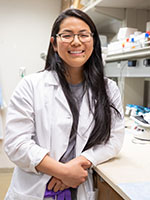 School of Pharmacy
School of Pharmacy
“I am extremely grateful to have been chosen as one of the 2020-2021 Magnuson Scholars, joining the great company of previous and current scholars. My sincere thanks to all of the generous donors, beloved friends and family of Senator Warren G. Magnuson. As I learn more about the incredible life and legacy of Senator Magnuson, I am truly honored to receive this scholarship, in memory of him and as a continuing legacy for his support of biomedical research. In what has been a challenging year for many reasons, receiving this award was a beacon of hope and promise, as I continue to work towards my dissertation.
The scholarship supports my research in the Medicinal Chemistry Department at the UW School of Pharmacy, under the mentorship of Dr. Libin Xu, investigating the pathophysiology of neurological defects in the metabolic disorder, Smith-Lemli-Opitz syndrome. While this year certainly presented obstacles to some aspects of research, I was thankfully able to stay productive and invest my time in a year-long appointment to the TL1 Training Grant offered by Institute of Translational Health Sciences, establishing a mentorship program in my department, a poster presentation for a virtual conference, additional coursework, and a first-author manuscript preparation, as well as other collaborative publications. I am overwhelmed with gratitude for all who have invested in my journey, and scholarships such as this one, to provide financial stability so that I can focus on my research and even start to make post-graduate plans with more assurance.”
Haylea Hannah
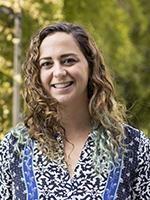
The scholarship has elevated my dissertation project to a new level, providing me with the support to focus more on my dissertation research, cover costs of data requests, offer compensation for those participating in interviews, and receive more advanced training in the technical skills needed to complete my dissertation aims. Funds from this scholarship were used to support remaining tuition costs during the Spring semester, during which I completed a quasi-experimental research design course, and complete trainings in advanced causal inference methods offered by the Society for Epidemiologic Research. The scholarship has also provided me with the opportunity to attend and present my research at two virtual conferences this year, allowing me to network and learn from experts in my field.
My dissertation research focuses on characterizing and evaluating medication for opioid use disorder (OUD) treatment programs offered in California jails. I aim to provide evidence that supports the expansion of treatment opportunities for individuals living with an OUD when they become incarcerated by integrating perspectives from those living with an OUD who were formerly incarcerated, key informants who manage and implement these policies, and quantitative evidence on how these policies influence criminal legal system, health, and cost outcomes.”
Asia Bishop
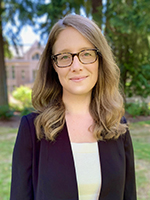
“I am incredibly honored and grateful to be a Magnuson Scholar. The support from this scholarship has allowed me to focus intensively on building my program of research. Since receiving the Magnuson scholarship, I have made substantial progress on my dissertation which examines how social identity and environmental factors shape health decision-making and health vulnerabilities for gang-involved youth. I was able to expand my dissertation aims to include a comprehensive, systematic review of the literature in order to clarify the mechanisms linking youth gang membership and health and highlight key gaps for future research – a time and labor-intensive project! In addition to being a useful contribution to the field, this work has informed two quantitative analyses of a state-wide survey which are currently underway. The Magnuson Scholarship has supported my efforts to build collaborations with faculty across campus and disseminate my research to guide culturally relevant and effective service approaches via scientific conference presentations and writing manuscripts for publication.
The Magnuson Scholarship has also provided me with dedicated time to engage in professional development opportunities to build my research and teaching practice. Since receiving the scholarship, I published two first-authored manuscripts on effective frameworks for service provision in the fields of community-based substance use prevention and the juvenile legal system. I also presented on the importance of incorporating social justice content into research methods curriculum at the annual meeting of the Council on Social Work Education. I am deeply grateful for the Magnuson family and their generous support of scholars like myself. I am excited to complete and defend my dissertation this year and continue my research to address health inequities and create meaningful change for marginalized youth populations as a faculty member at a research-intensive university.”